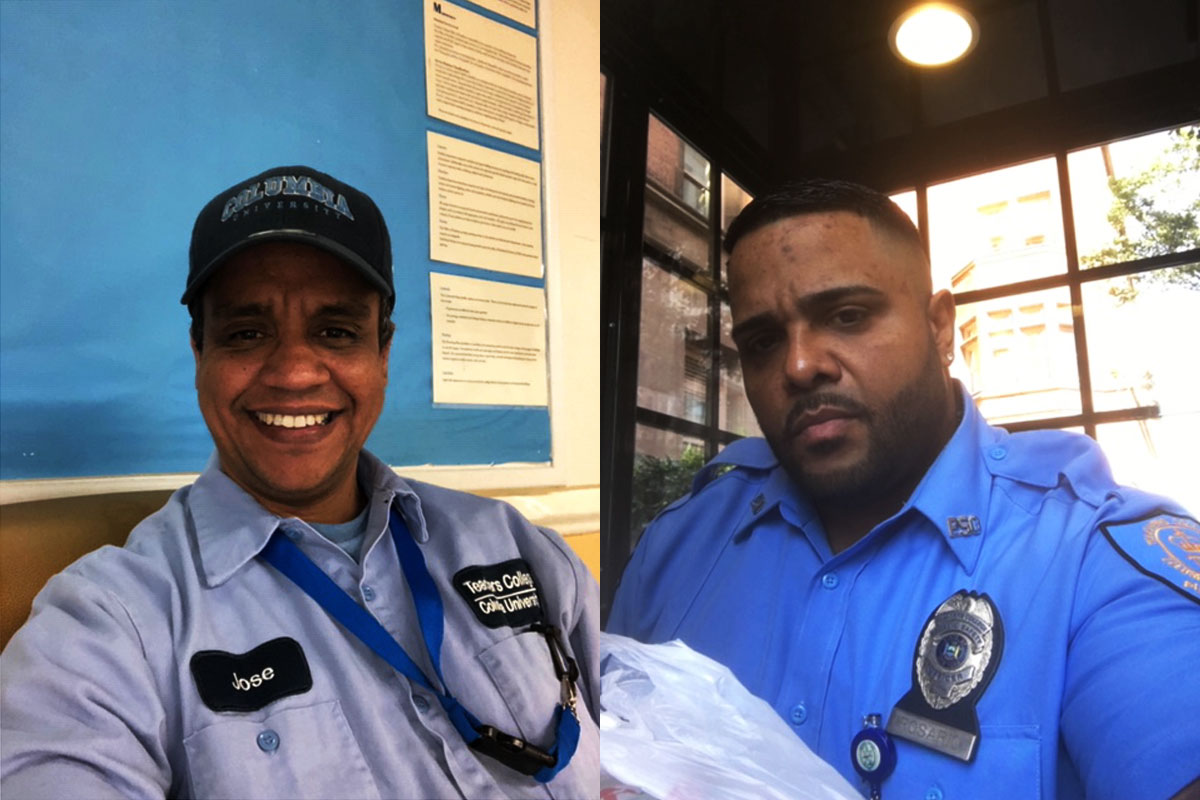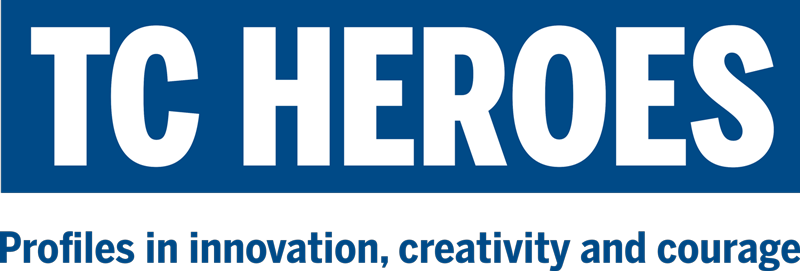Tariq Simmons used to begin his workday in the basement locker room of Whittier Hall, where he’d swap his street clothes for a Teachers College Department of Public Safety uniform.
Simmons still follows that routine — but since mid-March, when coronavirus began spreading rapidly in New York City, he’s boarded a mostly empty subway to come to work, and when he arrives, he dons a mask and gloves along with his uniform.
“It’s not the new normal,” says Simmons. “But it’s what is normal for right now.”
Facilities Management “mover” Jose Sanchez ordinarily conducts office relocations for new and established faculty, customizes the multi-functional Smith Learning Theater for different user groups, and reconfigures classroom furniture. He, too, still reports for work, but now he’s got a new portfolio: Disease prevention. Sanchez and the other 79 members of the Facilities team work daily to disinfect every doorknob, chair, table and fixture across the eight-building TC campus at least twice a day, and more frequently around the few entrances and other areas where a handful of administrators still come and go. It’s a painstaking process, and the masks and eerie silence don’t make it any more pleasant.
“The facilities, public safety and residential life teams are always here. This is what we do.”
— Brian Alford
“It’s sad, because we’re used to being around other staff and the students,” says Sanchez. “But we understand why they’re not here. I’m just glad I can help to make TC a little safer.”
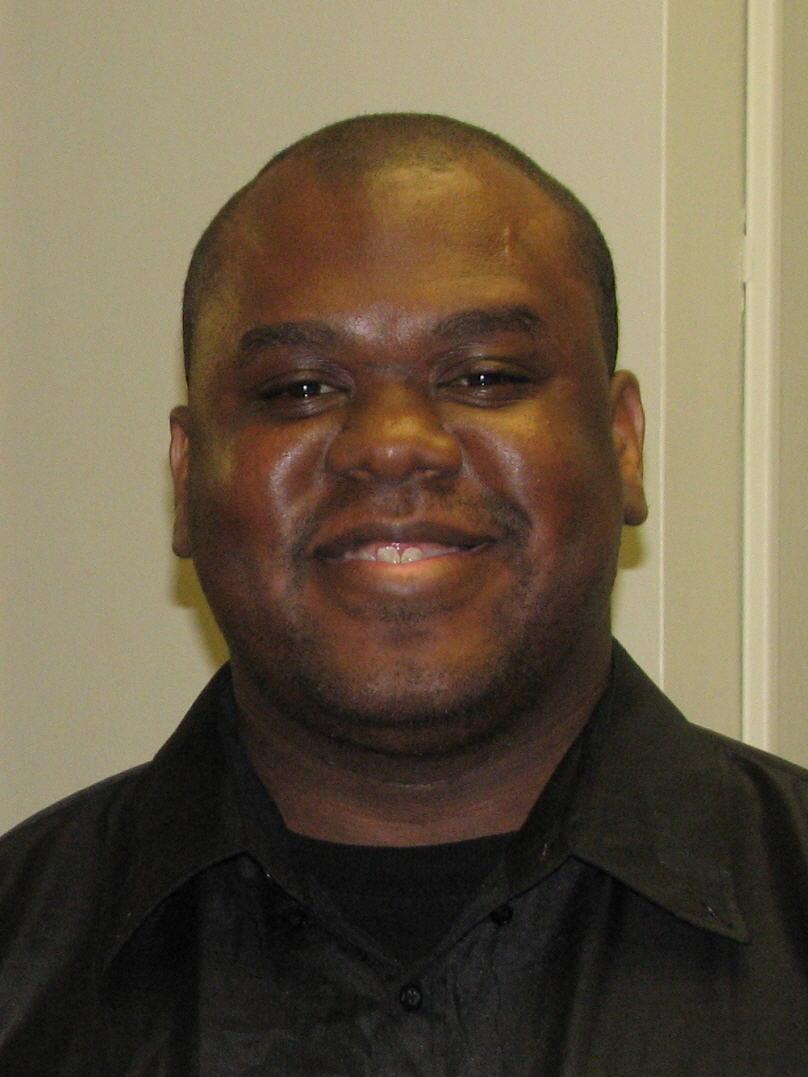
TAKING THE LONG VIEW The crisis isn‘t the new normal, says Public Safety Officer Tariq Simmons, “but it's what is normal for right now.” (Photo: TC Archives)
The stoicism of Simmons and Sanchez is typical of the 100-plus “essential staff” who have been reporting to West 120th street throughout the COVID crisis. While most TC community members work from home, connecting with colleagues via the digital remove of Zoom, Google Hangout, FaceTime and group chats, “the facilities, public safety and residential life teams are always here,” says Brian Alford, Assistant Vice President of Facilities. “This is what we do.”
“These people are the heroes,” adds John DeAngelis, Assistant Vice President for Public Safety. “They put their own safety on the line every day to keep Teachers College running.”
“These people are the heroes. They put their own safety on the line every day to keep Teachers College running.”
— John DeAngelis
A major focus for both groups, as well as for the staff of the Office of Residential Life, is to protect the 400-plus students still living in TC’s dorms.
“These students have stayed either because they’re from another country and can’t return home right now, or because the dorm is their primary residence, or simply because they’re afraid to relocate,” says DeAngelis. “We provide access control to protect against the virus — no outside folks coming into the residence halls.”
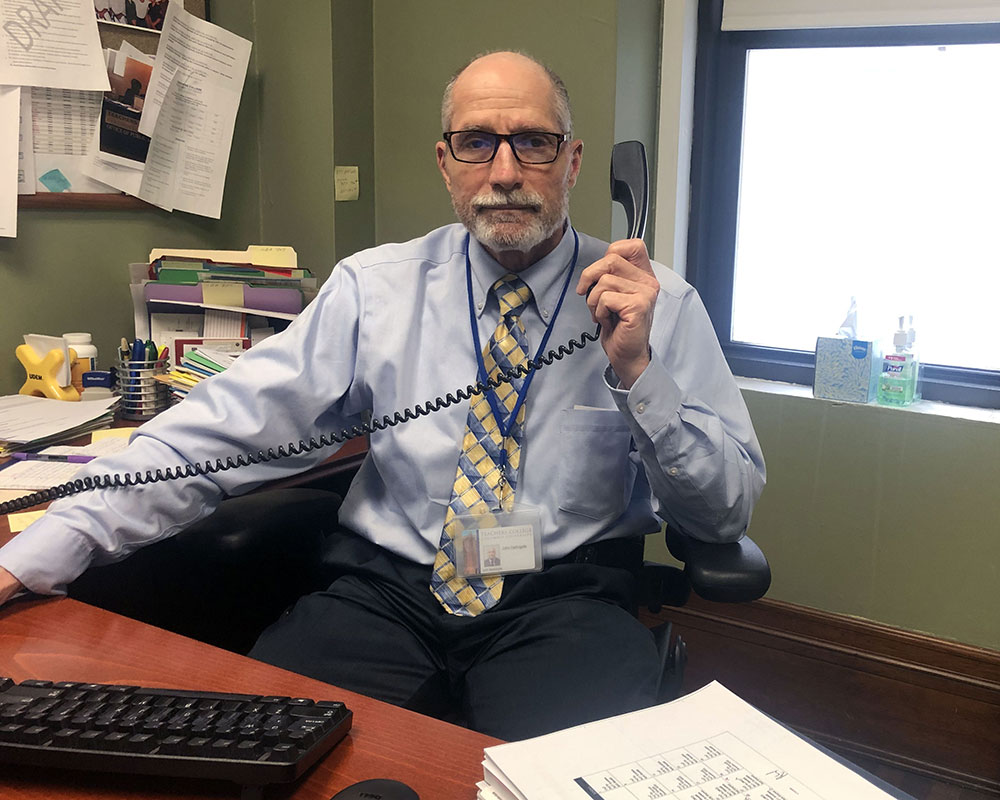
CALM IN THE EYE OF THE STORM DeAngelis and many members of his team are former police officers who are used to higher-stress situations. (Photo: TC Archives)
Thus far, there have been some 14-day isolations and quarantines in Bancroft, “but all have turned out fine,” DeAngelis says. “No one has been hospitalized on a long-term basis. And meanwhile, I think the students appreciate that we’re here. They’re comfortable seeing our staff, whose hearts are really in the right place. They want to take care of the students the best they can.”
Of course, an equally important priority is to try to protect the staff members themselves.
“In our meetings, we remind everyone to wear gloves and masks — but we also tell them, ‘Be cautious. Don’t rush,’” Alford says.
In addition to providing protective equipment, DeAngelis and Alford encourage team members to drive to and from work if they can — alone.
“At least parking is a non-issue — I’ve never seen this much parking around here,” laughs Public Safety Officer Josue Rosario, who has been driving in from his home in the Bronx.
“At least parking is a non-issue — I’ve never seen this much parking around here.”
— Josue Rosario
Rosario has watched over an empty campus before during holidays and other breaks in the academic calendar, but the COVID-19 crisis is different.
“I’ve been here 20 years,” he says, “and I’ve never seen it like this.”
Most people haven’t, unless they lived through the polio scares of the 1940s and 50s or — much more rarely — the 1918 influenza pandemic.
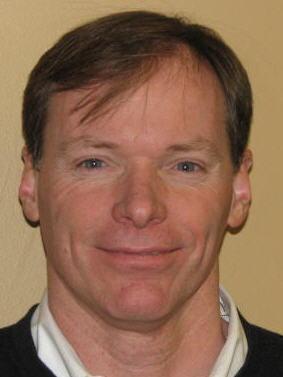
VIGILANCE IS HIS WATCHWORD Alford and his team disinfect some surfaces four times a day. “What’s scary is how little it takes for this thing to strike,” he says. (Photo: TC Archives)
“Nothing really prepares you for this,” Alford says. “We have a business continuity plan, which designates the essential stuff you need to keep doing, but it’s largely geared to floods, fires, power outages, hurricanes. This is a different situation. Now we have to think about how to clean, what to clean, what’s the process. So, we’re talking regularly to people with health expertise — the CDC, the equipment manufacturers and industry folks. Because what’s scary is how little it takes for this thing to strike. Just a drop on some surfaces is enough to put you at risk, especially if you have an underlying condition. That’s really the battle we’re fighting.”
DeAngelis is similarly engaged in a constant process of risk assessment and contingency planning.
“We have a representative on Columbia’s Infectious Disease working group, which meets weekly, and a rep on President Bailey’s coronavirus task force, and one on [Vice President for Finance and Administration] JoAnne Williams’ task force, which meets daily,” he says. “We have 28 public safety officers, but right now our staffing is down 25 percent due illnesses. And that really illustrates what our folks are going through and the risks to themselves and their families.”
“We’re see a lot of great teamwork, from the president on down, all aimed at making people safe, the best we can.”
— Jose Sanchez
The uncertainties posed by the crisis affect team members in different ways, DeAngelis adds. “Thirty-five percent of our folks are retired cops — all the managers and the midnight shift and a couple of others. They’re used to dealing with higher-stress situations — facing risk and allocating resources on the fly. Other folks are definitely finding this to be a bigger adjustment. But everyone is also mindful of the need to protect their own families.”
There is one other upside to the crisis.
“We’re see a lot of great teamwork, from the president on down, all aimed at making people safe, the best we can,” Jose Sanchez says. The fact that everyone is focused on that priority says a lot about people’s loyalty to the institution, he adds. “Teachers College has always been here for me. And I’ll always be there for Teachers College.”
— Steve Giegerich
